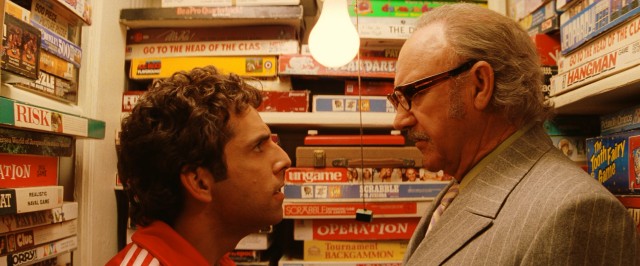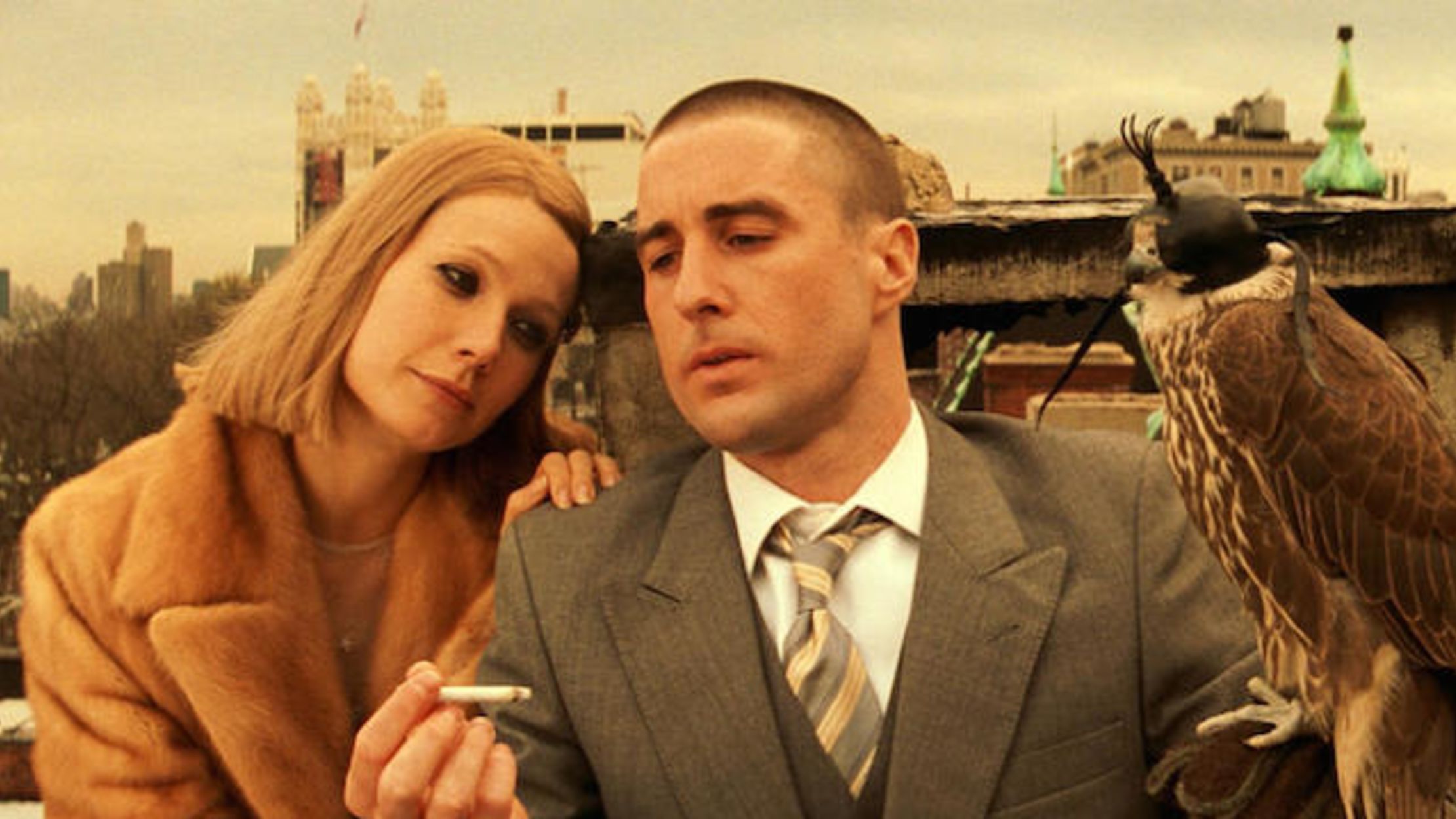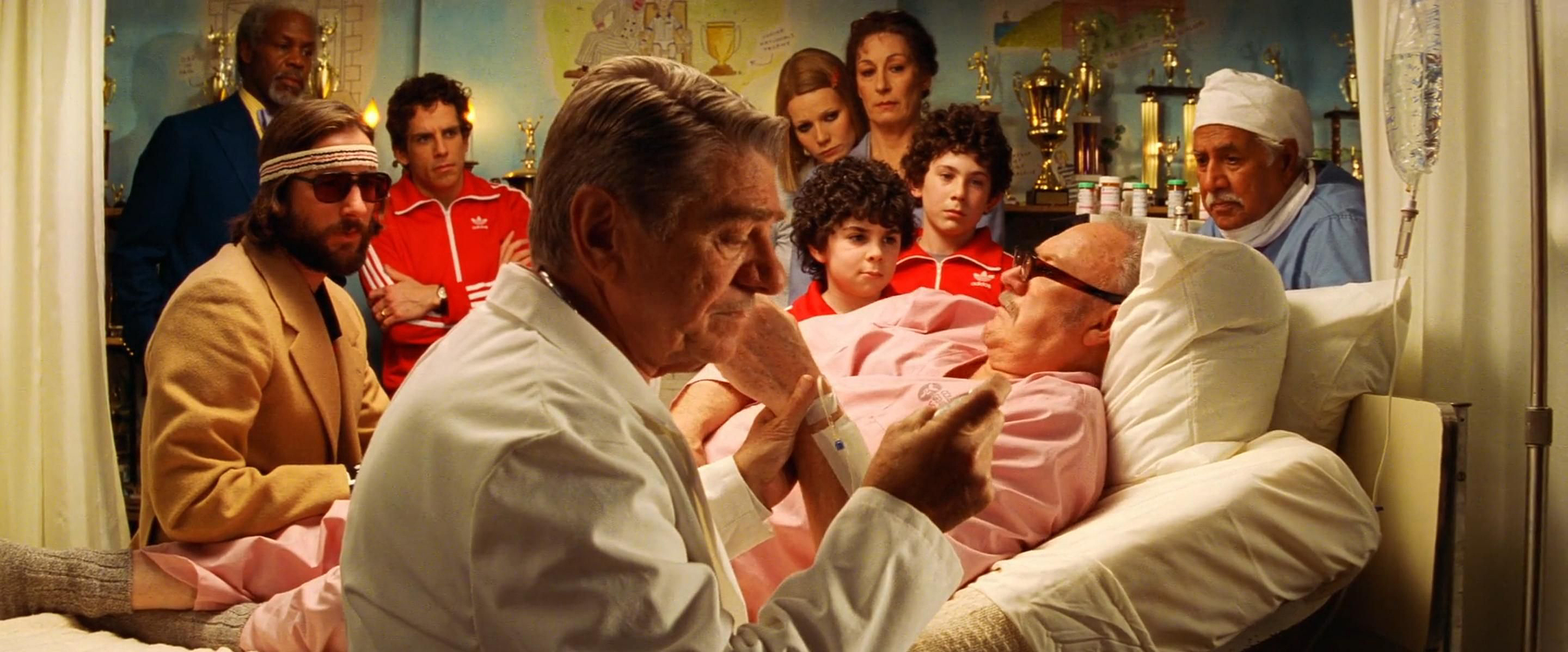The Royal Tenenbaums | Ben Stiller’s iconic tracksuit turns 20
“I had a lot riding on that match, you know. Financially and personally.”
It’s been 20 years since Wes Anderson introduced the world to a family in desperate need of a group hug. Anderson’s filmography normally reads like a psychiatrist’s dream cast of patients, but The Royal Tenenbaums stands out from the crowd… almost as much as each character in the film does.
An Anderson trademark is ensemble pieces and this really was his first attempt. In the midst of this ensemble however; Gene Hackman is truly astonishing. The Royal Tenenbaums centres on the escapades of the Tenenbaum family who cannot reckon with the reality of their lives. Royal Tenenbaum, played by Gene Hackman, is a patriarch in absentia who is trying to worm his way back into his family’s lives. Etheline Tenenbaum is a working mother who seems to keep the emotional side of herself distant while raising their three children. The pair separated but never divorced. The scene of Royal informing the children perfectly encompasses the tone that is struck here. When asked by his son if they are splitting up because of them, Royal replies with a resounding no which is then augmented with the idea of the couple having to make sacrifices by having children. Royal is not a man willing to think of his children’s feelings.
The three children are each prodigiously talented in their respective ways. Chas, played by Ben Stiller, is an entrepreneur and has his own room designed as a working office space. He breeds Dalmatian mice and sells them to pet shops. Margot, played by Gwyneth Paltrow, is a playwright who finds herself misunderstood by her father. She was adopted by the couple when she was two and Royal ensures she never forgets this as she is always introduced as “My adopted daughter”. Finally, Richie’s talent lies in tennis. Constantly sporting a sweatband, he shows immense talent. In fact, they all do. So much so that their mother wrote a book entitled ‘Family of Geniuses’. The bar was very much set for them from an early age.
However, life had other plans for the Tenenbaum children. Twenty-two years later, each child returns to live in their childhood home for varying reasons. The film’s narration informs the viewer that all memory of the children’s brilliance has now been erased. Chas is so shaken by the death of his wife that he has compulsively become infatuated with the safety of his children. He stages fire drills in the middle of the night, before concluding that the apartment is not safe enough. He returns to his childhood home, and informs his mother that his home needs new sprinklers (among other things). His mother informs him that her house’s safety features are not up to code either. Chas responds with the driest of deliveries: “We might have to do something about that too.”
Margot, now married to a much older man (paging Dr. Freud), is a sullen character whose very image personifies a cry for help. Once an aspiring playwright, she now hasn’t written a play in seven years. When she hears about how Chas has returned home, she instantly questions how he can be allowed to do so. When her mother tells her that he has been depressed, Margot instantly replies that she has as well, in a tone reminiscent of two young siblings fighting for the last drop of chocolate milk.
Finally, Richie is no longer the tennis prodigy he once was. He has not played tennis since experiencing a breakdown in the middle of a game. He now sails around the world while composing letters regarding his loneliness and love of his adopted sister to his best friend Eli (whom she herself has been having an affair with). Each child has been affected by a number of traumas. The stereotypical family unit is in ruin with little hope for the future.
On the face of it, when Royal Tenenbaum is first introduced to the film, one would not dare to suggest that he could be the solution to the family’s many woes. Especially not after his scheme to win them back is revealed to the viewer. Throughout the film, it is revealed that Royal was a primary reason for each of the children’s emotional issues. He shoots a pellet gun at Chas, leaving it permanently between his knuckles. He is brutally honest with Margot too the point that he criticises her play on the day of her birthday. In the case of Richie, he fails to be there for him when it is clear that Richie idolises him. This culminates in him chastising his son for having the breakdown in the middle of a game and costing him “financially and personally”.
Royal’s indiscretions are seen as the driving force behind the breakup of his marriage. The absence of him left a gaping hole in the children’s lives. Their respective issues may not have reached boiling point immediately upon his departure, but the incidents discussed above planted the seeds that would sprout and bloom as they reached adulthood. Nevertheless, the adult Tenenbaum children find their way home by chance or force.
The Royal Tenenbaums is a complex look at a dysfunctional family with an absent father. Anderson’s films are no stranger to the analysis of the father figure. The Darjeeling Limited explores grief and the loss of a father while The Life Aquatic with Steve Zissou deals with the quest for a paternal figure (eagle-eyed viewers may notice the Jacques Cousteau game in the Tenenbaum’s activity cupboard. He was an inspiration for the protagonist). Each film handles the idea differently but in the case of The Royal Tenenbaums, its central theme surrounds redemption. It is fixated on Royal, an absent father who suddenly wants a second chance. His supposed death sentence has given him a sense of realisation. He ambushes his wife and tells her he is dying. She reacts in hysterics before Royal assures her that he is not going to die.
Another outburst, the most seen in Anjelica Huston’s solid albeit underwritten performance, is aggressive and she attacks Royal before leaving. Just as she exits frame, Royal tells her he is, in fact, dying. The inability to clearly communicate is hardly a surprise given their estrangement, but also an Anderson essential. Why have two characters engage in simplistic dialogue when you can throw not just a spanner in the works, but the entire toolbox?
By this point Chas has already returned home, followed swiftly by Margot. However, it is explicitly the news of his father’s pressing death that sends Richie home. His troubles lead him to be as far as possible from the home setting but the news of his father’s condition is enough to see him rush home. The other children may have seemingly shrugged at the news given their own estrangement but Richie ends his retreat instantly. He even gives up his room to accommodate his father, choosing to sleep in a small tent in an image of arrested development even the most amateur of psychologists would diagnose.
Tensions arise from Chas’ inherent dislike and distrust of his father. Their history is complicated, and even includes lawsuits aplenty. A born entrepreneurial genius, he now sports Adidas tracksuits instead of business suits. He resents his father after he is shot by him as a child, among other indiscretions. The pellet lodged permanently between his knuckles serves as a constant reminder of his father’s nature.
The lack of affection is inherent in all of his children but Chas’ feels the most personal. He would rather see his supposedly ill father on the streets than back in his life. In the case of Margot, the estrangement was placed upon her before she had a chance to develop one of her own. The isolation she carries with her is instilled in her by her father who refuses to acknowledge her as such. She carries this throughout her life, finding solace in a number of lovers and partners.
She arrives eventually at Eli, played deftly by Owen Wilson. Eli lived across the street from the Tenenbaum clan and always wished to be a part of the family. It is no wonder that Margot, someone in the family by name but excluded by blood, finds some solace in his company. The pair want so desperately to be considered as a part of the family with Eli even sending his work to Margot’s mother Etheline for approval. Estrangement and isolation is a common facet of each character, to guess where it was instilled and who by, leaves few suspects.
So with the family’s problems established, a repentant Royal must come in and save the day in classical Hollywood fashion, right? Well… not quite. Royal’s initial reason for wanting to reconnect with his family is simply because he is broke. The fact that his wife is also being courted by an accountant serves as the final straw that spurs him on towards concocting a plan. His selfish behaviour is the beginning of all the trouble that follows. He impedes upon his wife’s happiness by depriving her of companionship from a perfectly reasonable man. Henry Sherman, played by Danny Glover, is the antithesis to Royal. He is soft-spoken and felt that he needed an excuse to draw Etheline’s attention to a marriage proposal.
Royal is brash and says things immediately as they enter the periphery of his brain. He believes that just because he is in need, the family will rally around him. Upon meeting his grandchildren, he expresses his condolences with the immortal line: “I’m very sorry for your loss. Your mother was a terribly attractive woman.” His inability to recognise his behaviour is a constant cause of strain on the family. He butts heads with Chas and treats Sherman as a foe that must be vanquished. He consistently fails to recognise the impact he has on those around him. When he initially returns to the house, he is more surprised about his mounted javelina being missing from the wall than Chas’ cold reaction to his return. Pride truly does cometh before the fall. In this case, the fall is paramount to Royal’s character development.
Hackman plays the role in a manner that few actors could have. Royal is a deceitful man purely driven by self-interest. Hackman instils a sense of pathos to a role that is, on paper at least, despicable. Even on his way out of the house, he finds a shred of humanity to come clean to Etheline that at first the plan was to win her back, then it was reconfigured to oust Sherman, before finally admitting the main factor: “I was broke”. Royal is sent away from his family once more.
Only this time, he finally saw what could have been. When the truth comes out, he reaches a point of clarity in admitting that the short time they spent together was the best period of his life. He is cast out once more and this time, the feeling of permanence is especially strong. The scene where Royal rushes to the hospital for his son who has attempted suicide is made all the more poignant as he is being informed that he cannot be allowed up due to the family’s wishes. His downfall has truly arrived.
The character of Royal is one who in the short span of an hour’s run-time thus far, does not exactly seem the type to warrant, or even deserve a redemption arc. Well as it is an Anderson film, things aren’t as clear as they seem. His characters tend to be quite eccentric in appearance, but desperately relatable and lived-in beneath the surface. Royal’s redemption may appear sincere but there will always be an undercurrent of self-interest. As shown in the sequence wherein Richie visits Royal at his new job, an elevator operator in the hotel he was once kicked out of. Before making the trip, Richie re-hangs the mounted javelina head (a symbol of Royal’s authority as it was removed to coincide with his numerous removals from the family) that Royal had searched for. He surprises his father who acts nonchalantly.
Richie enquires as to why he got the job, to which Royal response is “we’re broke” before explaining the real reason: “I wanted to prove I could pay my dues… I just hope somebody notices.” Just as he reaches that microscopic point of clarity, he upends it by re-affirming a selfish desire to be seen doing so. What is also noticeable here is his honesty in coming forward with such information. The Royal Tenenbaum who is simultaneously brutally honest where he doesn’t need to be, and a scheming liar where he does, is showing signs of change.
What follows is a conversation regarding the complicated love between Richie and Margot. Another sign of development in Royal is that he needs to be reminded that Margot isn’t related by blood, to which he perfectly responds that “It’s still frowned upon, but then what isn’t these days, right?” Royal finally reaches an epiphany when he tells Richie to not take any advice from him. He asks Richie if he still recognises him as his father, before expressing a wish to have done more in that role. The development in this sequence alone brings about the necessary evolution in Royal that was desperately needed. What follows is a direct result of the impact he makes in attempting to bring about unity and repair within the family.
Royal’s redemption is certainly a complicated process. He begins the film as an individual who seemingly only ensured his own happiness before all else. By the end, it is his actions that lead to each character’s happy ending… well not exactly, but close enough! He attempts to repair the fragmented relationship with Margot by bringing her to an ice-cream parlour populated by men with their adolescent daughters. When faced with resistance from Margot, he begs the question: “Can’t somebody be a shit their whole life and try to repair that damage?”
Things cannot be repaired overnight but the effort is there. He attempts to bring Chas and his children to the graveyard to visit the grave of Chas’ wife before being ignored. He visits her grave nonetheless with nobody else with him. The man, who initially didn’t know where his daughter-in-law was buried, goes because he wants to pay his respects. Finally, he grants his wife the divorce papers she needs to marry Henry Sherman. She hasn’t directly asked for them, but it is clear that she has feelings for the man and intends to end her romantic isolation.
The last relationship left to be repaired is that of he and Chas. The son who provided the most resistance is still not speaking with him. This culminates in a moment of outright heroism. A ‘save-the-cat’ moment, if you will. Royal saves his grandsons’ lives by pulling them out of the way of a speeding car. He fails to save the dog, but brings a new dog to Chas: a Dalmatian which harkens back to Chas’ first entrepreneurial gambit of selling mice that resemble Dalmatians. They share a tender moment that shows that the foundation remains and their love can return.
The Royal Tenenbaums was the film that cemented Anderson’s aesthetics and showed them to the world. To watch this film twenty years after the release date, is to witness where everything came together. It also provided the world a glimpse of a mature Anderson who was ready to shed his focus on adult children (as seen in Bottle Rocket and Rushmore) and move into a more complex direction. All in all, Royal Tenenbaum’s redemption is one for the ages.
It may not be the flashiest, it may not be the most heroic, but if it isn’t one of the most satisfying character arcs out there then this writer will eat a shoe. If even the most stone-hearted of us out there didn’t feel it in our guts when Ben Stiller utters the line; “I’ve had a rough year, Dad”, then what monsters are we? Wes Anderson films are intrinsically filled with characters who can rarely express emotion beyond a sardonic or deadpan response.
To recognise one’s failures is one thing, but to actually go out of one’s way to repair the damage is another. Royal’s journey begins as antagonist of the highest order, but ends as someone who wants nothing more than a relationship with his family. He may have once had a lot financially riding on the scheme to win them back. But he ends up having gained the most he possibly could have… personally.
The Royal Tenenbaums is now streaming on Disney Plus.




